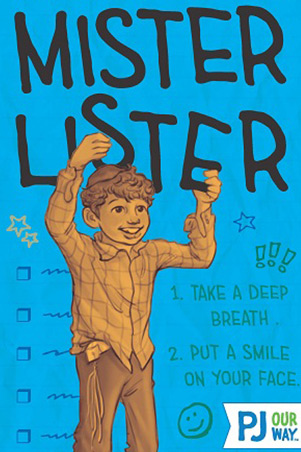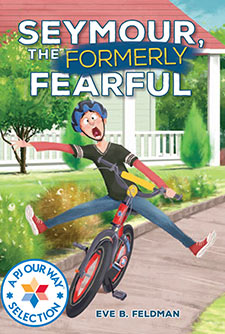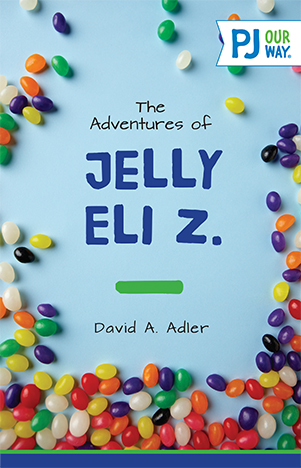Mister Lister
Reuven is excited to be starting at a new school. He’s worried too, since he’s messy and loud and finds it hard to make friends. Luckily, Reuven has a secret weapon: He has an amazing memory for lists. Meet Mister Lister!
Average Rating
( hint: Login to leave a review! )
69 Reviews
Leave Review
What the Book is About
Jewish Content & Values
Positive Role Models
Content Advisory
Talk it Over!
More for You
What the Book is About
Reuven is loud, clumsy, and misreads social cues, so he finds it hard to fit in with his classmates and gets into scrapes in the classroom. He’s excited about starting third grade but worries about going to a new school. At first it seems he’s getting off on the wrong foot with the other boys, but a kindly teacher and his own amazing memory for lists help Reuven discover that he can make friends just by being himself. This sweet book gives young readers an accessible insight into Reuven’s neurodiversity and his traditional Orthodox world.
Jewish Content & Values
- Reuven’s family is Orthodox. They observe all the Jewish holidays and say a different specialized bracha (prayer) before eating different foods, viewing a rainbow, or even wearing new clothes.
- Reuven and his sister go to a Jewish day school where the boys and girls are educated separately. They daven (pray) in the classroom, and the illustrations show that all the boys wear a kippah. The boys have traditional Hebrew names like Ephraim, Levi, and Tzvi.
- A key dramatic focus of the book is the school “brachot bee,” in which children compete to see which team can recall the most brachot.
- Reuven calls his parents Abba (dad) and Ima (mom).
Positive Role Models
- Rabbi Goodman is kind and gentle with Reuven. When Reuven and another boy have an argument, he uses role play to help them understand how they could do things differently next time. He tells the class that, even if they don’t win the competition, they are all winners because they have learned so much.
- Reuven learns to think before he acts and consider the feelings of others. He studies hard and becomes co-captain of the brachot bee team. He grows through the course of the story in a way that will be relatable for many readers.
- Shira, Reuven’s sister, chooses to study for the brachot bee with Reuven instead of her friends, and, even though her own team loses in the final, she is thrilled that her little brother has led his team to victory.
Content Advisory
None.
Talk it Over!
- Near the beginning of the book, Reuven upsets Amos by pulling too hard on his shirt, and later he pushes between Levi and Amos to get a closer look at the chess game, causing Amos to fall onto the chess board. Have you ever done something by accident that upset your friends? How did you make it better? What did you learn from the experience?
More for You
In Mister Lister, Reuven and his friend David bond over a chessboard, and Reuven appreciates the orderliness and consistency of the game. In fact, chess has occasionally been referred to as the “Jewish National Game.” Forty percent of the World Chess Champions have been Jewish, including the first two official champions, Wilhelm Steinitz and Emanuel Lasker. The world record for the most simultaneous chess games was held until 2011 by Alik Gershon, who won 454 out of 523 games over a period of 19 hours.
What the Book is About
What the Book is About
Reuven is loud, clumsy, and misreads social cues, so he finds it hard to fit in with his classmates and gets into scrapes in the classroom. He’s excited about starting third grade but worries about going to a new school. At first it seems he’s getting off on the wrong foot with the other boys, but a kindly teacher and his own amazing memory for lists help Reuven discover that he can make friends just by being himself. This sweet book gives young readers an accessible insight into Reuven’s neurodiversity and his traditional Orthodox world.
Jewish Content & Values
Jewish Content & Values
- Reuven’s family is Orthodox. They observe all the Jewish holidays and say a different specialized bracha (prayer) before eating different foods, viewing a rainbow, or even wearing new clothes.
- Reuven and his sister go to a Jewish day school where the boys and girls are educated separately. They daven (pray) in the classroom, and the illustrations show that all the boys wear a kippah. The boys have traditional Hebrew names like Ephraim, Levi, and Tzvi.
- A key dramatic focus of the book is the school “brachot bee,” in which children compete to see which team can recall the most brachot.
- Reuven calls his parents Abba (dad) and Ima (mom).
Positive Role Models
Positive Role Models
- Rabbi Goodman is kind and gentle with Reuven. When Reuven and another boy have an argument, he uses role play to help them understand how they could do things differently next time. He tells the class that, even if they don’t win the competition, they are all winners because they have learned so much.
- Reuven learns to think before he acts and consider the feelings of others. He studies hard and becomes co-captain of the brachot bee team. He grows through the course of the story in a way that will be relatable for many readers.
- Shira, Reuven’s sister, chooses to study for the brachot bee with Reuven instead of her friends, and, even though her own team loses in the final, she is thrilled that her little brother has led his team to victory.
Content Advisory
Content Advisory
None.
Talk it Over!
Talk it Over!
- Near the beginning of the book, Reuven upsets Amos by pulling too hard on his shirt, and later he pushes between Levi and Amos to get a closer look at the chess game, causing Amos to fall onto the chess board. Have you ever done something by accident that upset your friends? How did you make it better? What did you learn from the experience?
More for You
More for You
In Mister Lister, Reuven and his friend David bond over a chessboard, and Reuven appreciates the orderliness and consistency of the game. In fact, chess has occasionally been referred to as the “Jewish National Game.” Forty percent of the World Chess Champions have been Jewish, including the first two official champions, Wilhelm Steinitz and Emanuel Lasker. The world record for the most simultaneous chess games was held until 2011 by Alik Gershon, who won 454 out of 523 games over a period of 19 hours.




